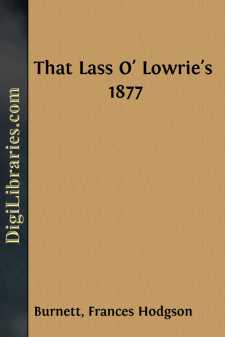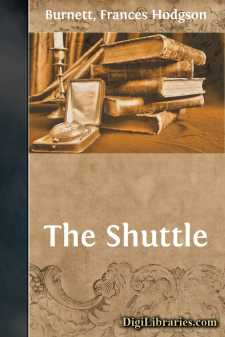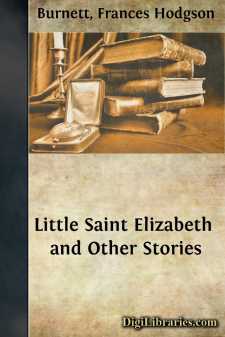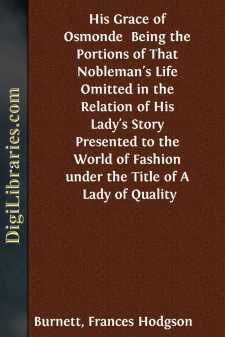Categories
- Antiques & Collectibles 13
- Architecture 36
- Art 48
- Bibles 22
- Biography & Autobiography 813
- Body, Mind & Spirit 142
- Business & Economics 28
- Children's Books 17
- Children's Fiction 14
- Computers 4
- Cooking 94
- Crafts & Hobbies 4
- Drama 346
- Education 46
- Family & Relationships 57
- Fiction 11829
- Games 19
- Gardening 17
- Health & Fitness 34
- History 1377
- House & Home 1
- Humor 147
- Juvenile Fiction 1873
- Juvenile Nonfiction 202
- Language Arts & Disciplines 88
- Law 16
- Literary Collections 686
- Literary Criticism 179
- Mathematics 13
- Medical 41
- Music 40
- Nature 179
- Non-Classifiable 1768
- Performing Arts 7
- Periodicals 1453
- Philosophy 64
- Photography 2
- Poetry 896
- Political Science 203
- Psychology 42
- Reference 154
- Religion 513
- Science 126
- Self-Help 84
- Social Science 81
- Sports & Recreation 34
- Study Aids 3
- Technology & Engineering 59
- Transportation 23
- Travel 463
- True Crime 29
That Lass O' Lowrie's 1877
Description:
Excerpt
CHAPTER I - A Difficult Case
They did not look like women, or at least a stranger new to the district might easily have been misled by their appearance, as they stood together in a group, by the pit's mouth. There were about a dozen of them there—all "pit-girls," as they were called; women who wore a dress more than half masculine, and who talked loudly and laughed discordantly, and some of whom, God knows, had faces as hard and brutal as the hardest of their collier brothers and husbands and sweethearts. They had lived among the coal-pits, and had worked early and late at the "mouth," ever since they had been old enough to take part in the heavy labor. It was not to be wondered at that they had lost all bloom of womanly modesty and gentleness. Their mothers had been "pit-girls" in their time, their grandmothers in theirs; they had been born in coarse homes; they had fared hardly, and worked hard; they had breathed in the dust and grime of coal, and, somehow or other, it seemed to stick to them and reveal itself in their natures as it did in their bold unwashed faces. At first one shrank from them, but one's shrinking could not fail to change to pity. There was no element of softness to rule or even influence them in their half savage existence.
On the particular evening of which I speak, the group at the pit's mouth were even more than usually noisy. They were laughing, gossiping and joking,—coarse enough jokes,—and now and then a listener might have heard an oath flung out as if all were well used to the sound. Most of them were young women, though there were a few older ones among them, and the principal figure in the group—the center figure, about whom the rest clustered—was a young woman. But she differed from the rest in two or three respects. The others seemed somewhat stunted in growth; she was tall enough to be imposing. She was as roughly clad as the poorest of them, but she wore her uncouth garb differently. The man's jacket of fustian, open at the neck, bared a handsome sunbrowned throat. The man's hat shaded a face with dark eyes that had a sort of animal beauty, and a well-molded chin. It was at this girl that all the rough jokes seemed to be directed.
"I'll tell thee, Joan," said one woman, "we'st ha' thee sweetheartin' wi' him afore th' month's out."
"Aye," laughed her fellows, "so we shall. Tha'st ha' to turn soft after aw. Tha conna stond out again' th' Lunnon chap. We'st ha' thee sweetheartin', Joan, i' th' face o' aw tha'st said."
Joan Lowrie faced them defiantly:
"Tha'st noan ha' me sweetheartin' wi' siccan a foo'," she said, "I amna ower fond o' men folk at no time. I've had my fill on 'em; and I'm noan loike to tak' up wi' such loike as this un. An' he's no an a Lunnoner neither. He's on'y fro' th' South. An th' South is na Lunnon."
"He's getten' Lunnon ways tho'," put in another. "Choppin' his words up an' mincin' 'em sma'. He's noan Lancashire, ony gowk could tell."
"I dunnot see as he minces so," said Joan roughly. "He dunnot speak our loike, but he's well enow i' his way."
A boisterous peal of laughter interrupted her....












